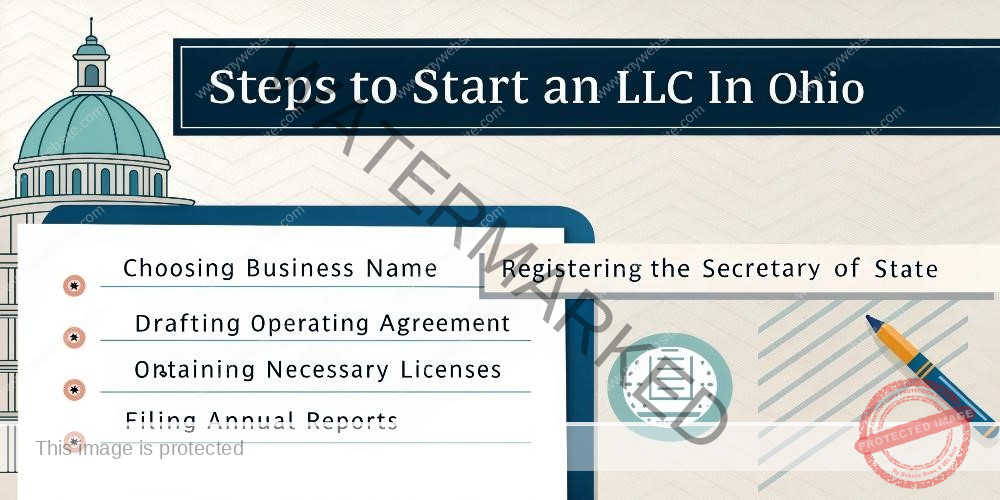Starting a Limited Liability Company in Ohio is a popular choice for entrepreneurs seeking to combine liability protection with flexible business management. Forming an LLC provides a legal structure that shields the owners’ personal assets from business debts and legal actions. In addition to these protective benefits, LLCs are relatively simple to form and offer adaptable tax options. Ohio is a favorable state for LLC formation due to its straightforward regulations and lack of a general franchise tax, making it attractive for small businesses and startups.
However, launching an LLC is not just about filing paperwork. It involves several crucial steps that ensure the business is legally compliant and properly structured for future growth. Understanding what is required to start an LLC in Ohio means going beyond basic registration. It means being aware of state-specific procedures, naming rules, document requirements, and ongoing responsibilities. This guide walks through every major step and detail involved in forming an LLC in the state of Ohio.
Choosing a Unique and Compliant Name
The first and most foundational step in starting an LLC is selecting a name for the business. Ohio law requires that the name be distinguishable from any other business entity registered in the state. It must also include a designator such as Limited Liability Company or the abbreviation LLC at the end. This requirement helps clearly identify the legal nature of the entity to customers, vendors, and regulatory agencies.
Before settling on a name, it is essential to perform a thorough search using the Ohio Secretary of State’s business name database. This will confirm that the desired name is available and does not conflict with existing businesses. Additionally, entrepreneurs may choose to reserve a name for up to one hundred eighty days by submitting a Name Reservation Form and paying a small fee. Reserving the name can be useful while preparing the necessary documents for formal registration.
Appointing a Statutory Agent in Ohio
Every LLC in Ohio is required to appoint a statutory agent, which is the official contact for receiving legal documents and state correspondence. The agent can be an individual resident of Ohio or a business entity authorized to do business in the state. This role is critical because failure to maintain an active and accurate statutory agent can lead to administrative dissolution of the LLC.
The statutory agent must have a physical address in Ohio, known as the registered office. Post office boxes are not accepted. When filing the Articles of Organization, the name and address of the statutory agent must be provided along with a signed acceptance of appointment. Many businesses choose to hire professional registered agent services to ensure consistent availability and compliance with legal notice requirements.
Filing the Articles of Organization
The central document required to legally create an LLC in Ohio is the Articles of Organization. This form officially registers the business with the state and provides basic information such as the LLC name, duration, purpose, statutory agent details, and whether the company will be managed by its members or by appointed managers.
Filing can be completed online through the Ohio Secretary of State’s website or by submitting a paper form by mail. There is a standard filing fee that must be paid at the time of submission. Processing times may vary, but expedited services are available for an additional cost. Once approved, the state issues a stamped copy of the Articles of Organization, which serves as proof of the LLC’s legal existence.
Drafting an Operating Agreement
While not required by Ohio law, creating an operating agreement is one of the most important internal documents for any LLC. This document outlines the ownership structure, profit distribution, member responsibilities, and decision-making procedures of the business. It also helps prevent misunderstandings and legal disputes among members.
The operating agreement serves as the LLC’s governing document and is especially valuable for multi-member LLCs. Even single-member LLCs benefit from having a written agreement because it strengthens the separation between the individual and the business. In the event of a lawsuit or audit, this separation can help protect the owner’s personal assets and reinforce the limited liability status of the LLC.
Obtaining an Employer Identification Number
After forming the LLC, the next step is to obtain an Employer Identification Number from the Internal Revenue Service. This number functions similarly to a Social Security Number for the business and is necessary for opening bank accounts, filing taxes, and hiring employees. Even single-member LLCs need an EIN if they plan to hire staff or elect corporate taxation.
The EIN application can be completed online through the IRS website and is free of charge. Once obtained, the EIN remains the permanent identifier for the business at the federal level. This number is also used when submitting federal tax returns, applying for business credit, and complying with various state and federal regulations.
Registering for Ohio State Taxes
Depending on the type of business activities the LLC engages in, registration with the Ohio Department of Taxation may be required. Common tax registrations include sales and use tax, commercial activity tax, and employer withholding tax. Businesses selling taxable goods or services must collect sales tax and remit it to the state on a regular basis.

Registration is done through the Ohio Business Gateway, which is the central portal for many state-level filings and licenses. The system allows businesses to register for multiple tax accounts at once and to manage their filings online. Accurate registration ensures that the LLC complies with all applicable tax laws and avoids potential penalties or interest charges.
Opening a Business Bank Account
Opening a dedicated business bank account is an important step that helps establish a financial identity for the LLC. It ensures that business and personal finances remain separate, which is essential for maintaining limited liability protection. Commingling funds can jeopardize that protection and may lead to personal exposure in lawsuits or tax audits.
To open a business bank account, most financial institutions will require a copy of the Articles of Organization, the EIN, and possibly the operating agreement. A business account also makes it easier to accept payments, pay expenses, track income, and prepare for tax filing. It enhances professionalism and allows for better financial management and growth tracking.
Obtaining Licenses and Permits
Certain types of businesses require additional licenses or permits before they can operate legally in Ohio. These may be issued at the state, county, or municipal level and vary depending on industry and location. Common licenses include professional licenses, health permits, signage permits, and local business operation licenses.
To determine which licenses are necessary, business owners should consult the Ohio Business Gateway and local city or county offices. Obtaining the proper licenses ensures that the LLC can operate without interruption and avoids legal penalties. Renewing these licenses annually or as required is part of maintaining legal compliance throughout the business lifecycle.
Complying with Local Zoning and Business Rules
Before launching operations, it is important to ensure the business location complies with local zoning laws and property regulations. Zoning rules dictate what types of business activities are allowed in specific areas. For example, operating a retail store from a residential property may be prohibited in certain municipalities.
Business owners should check with their city or county zoning office to confirm that the proposed business location is permitted for the type of services or goods they plan to offer. Securing a certificate of zoning compliance or occupancy may be necessary before opening the business to the public. This step helps prevent future disputes or forced closures.
Maintaining Compliance and Good Standing
After formation, LLCs must remain compliant with state and federal regulations to retain their legal status. In Ohio, this includes maintaining a current statutory agent, renewing business licenses, paying required taxes, and updating business records when changes occur. Good standing allows the business to operate legally, enter contracts, and apply for loans.
Failure to comply with legal requirements can result in penalties, loss of good standing, and even administrative dissolution by the state. Keeping a compliance calendar and reviewing obligations regularly helps ensure that the LLC remains in full legal operation and avoids costly reinstatement procedures.
Understanding Annual and Biennial Requirements
Ohio does not require standard annual reports from domestic LLCs, which reduces the administrative burden compared to other states. However, certain events such as changes to the statutory agent or business address do require prompt updates to the Secretary of State. These filings may involve fees and require the correct documentation.
In some cases, such as foreign LLCs or licensed professionals, biennial filings may be required. Business owners should understand which reporting schedule applies to their LLC and file accordingly. Regularly reviewing the business’s status through the Secretary of State’s website helps identify any missed filings or issues needing attention.
Insurance and Risk Management Planning
While not a legal requirement, obtaining business insurance is a wise step for protecting the LLC from potential risks. Common types of insurance include general liability, professional liability, commercial property insurance, and workers’ compensation coverage. The type of insurance needed depends on the industry, size, and operations of the business.
Insurance helps safeguard the business from lawsuits, property damage, and liability claims. It can also be a requirement for certain contracts or leases. Consulting an insurance broker can help determine the appropriate coverage and premiums. A well-rounded risk management plan includes both insurance and internal controls to minimize exposure and protect assets.
Working with Legal and Financial Professionals
Forming an LLC is a legal process that can be completed independently, but many entrepreneurs benefit from professional assistance. Attorneys can provide guidance on drafting operating agreements, understanding liability implications, and selecting the appropriate legal structure. Accountants can assist with tax planning, financial setup, and ongoing compliance.
Working with professionals ensures that the LLC is formed correctly from the start and that important issues are addressed proactively. These experts can help navigate complex regulations, prepare for growth, and identify tax-saving strategies. Investing in quality advice often results in long-term savings and stronger business foundations.
Creating a Business Plan and Strategy in Ohio
Although not a formal requirement, developing a comprehensive business plan is highly recommended when forming an LLC. A business plan outlines the mission, goals, marketing strategy, financial projections, and operational plans for the company. It serves as a roadmap for success and a tool for securing funding or investment.

A clear business strategy also helps define the LLC’s identity in the marketplace. It clarifies the value proposition, target audience, pricing structure, and competitive advantages. Business plans are essential for growth and can be updated as the company evolves. Having a strategic framework in place improves decision-making and long-term success.
Conclusion
Starting an LLC in Ohio involves more than just filling out a few forms. It requires careful planning, legal compliance, and ongoing responsibility. From choosing a compliant name and appointing a statutory agent to filing the Articles of Organization and setting up tax accounts, each step plays a critical role in creating a solid business foundation. Additional considerations such as insurance, licensing, zoning, and banking further strengthen the LLC’s ability to operate legally and efficiently.
By following the proper procedures and understanding all required elements, entrepreneurs can successfully launch and grow their LLC in Ohio. This structure offers significant benefits in terms of liability protection and operational flexibility. However, those benefits are only fully realized when the business is formed and maintained with attention to legal and regulatory details. With the right preparation and support, forming an LLC in Ohio can be a rewarding and secure step toward entrepreneurial success.















